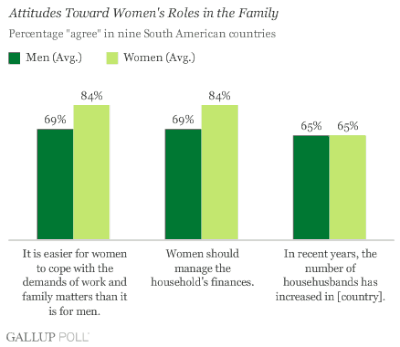
The typical roles of women in Latin American history has much to do with the marianismo vs. machismo lifestyle. Usually a woman is expected to stay at home and take care of the children and cook for the family. She is supposed to be the sanctity of the home and represent the Virgin Mary. Marianismo is simply “the cult of feminine spiritual superiority, which teaches that women are semi-divine, morally superior to and spiritually stronger than men.” (Stevens, 91)
The women, according to traditional popular opinion, should not be involved with politics. This was soon evaded by the famous Evita, from Argentina. She wascalled by many people the mother and care taker of Argentina. Although she is known to be a very famous feminist, she excludes this from her lifestyle. She says, “I am Eva Perón, the wife of a president, whose work is pleasant and simple… and I am also Evita, the wife of a leader of a people who deposited in him all their faith, hope, and love." Usually, people in Latin America thought that women at the top only got there by sleeping with influencial men. Whether or not this was true, Evita is far more famous than Perón in regards to public figureheads and popularity among the people.
Female gender roles began to shift in Cuba. The women of Cuba had the highest literacy rate compared to other Latin American countries with 78.8 percent. This is impressive even by United States’s standards, but the shift does not end in Cuba. The recent Mexico female nominee encouraged the people to see how women can work to encourage economic justice. The Madres de la Plaza de Mayo also represent a break from traditional gender roles in Latin America. Equality of women's rights are reflective of Latin American women's attitudes. These women are “submissive to the demands of the men: husbands, sons, fathers, brothers.” (Stevens, 95) Whether or not women agree to these demands depends on the women themselves. There are female doctors, surgeons, librarians, lawyers, and political activists who claim their husbands are the best parts of their lives, and they would do everything for them, as illustrated below.
(Engineer, 34, married, two children)
My husband is my life, He is my reason for living, My work is important but without him I would be lost.He listens to me rant and rave about the things that happened during the day. He is a comfort. (Kinzer, 167)